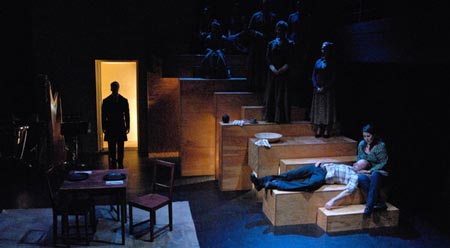Gustav Holst, the English composer best known for his orchestral suite The Planets, was a man of many interests and influences, musical and otherwise, from Walt Whitman to Wagner, socialism to Hindu mysticism. Among other accomplishments, he contributed to the genesis of 20th century English-language opera with his brief one-act work of 1908, Savitri (Opus 25), based on an episode from the the ancient epic known as the Mahabharata, with a libretto translated from the Sanskrit by the composer.

Savitri and her woodsman husband Satyavan live a rough existence in the woods sustained by a deep devotion to one another, until Death personified pays them a visit. It’s a distressing tale in Holst’s chamber opera version, in which the bulk of the heavy musical lifting falls on the mezzo-soprano who plays Savitri – at the evening performance I attended, the crystal-voiced and emotionally intense Heather Johnson. Philip Shneidman, Founder and Artistic Director of the little OPERA Theatre of NY, which we have to thank for this production, stages Savitri like a silent-era horror film, with exaggeratedly slow movements, breast-beating emoting, and actually scary special effects.
The mesmerizing Ms. Johnson was ably matched by tenor Rufus Müller as her devoted husband Satyavan, though he strained on a few high notes. As Death, bass-baritone Michael Scarcelle was effectively terrifying, but his tone tended to lack clarity. A choir of eight female singers added angelic seriousness to the sombre scenes with episodes of Holst’s haunting multi-part harmonies. The music overall is a careful balance of the harmonious and the unexpected.
I would have enjoyed this spectacle more, though, had it preceded rather than followed the lively and humorous The Wandering Scholar, a work from later in Holst’s life (opus 50) which the composer never lived to see performed. It’s hard to image Holst not liking this version, a chamber-performance reduction created by Benjamin Britten and Holst’s daughter Imogen Holst after the composer’s death, with a libretto by Clifford Bax.
The Wandering Scholar is a medieval bedroom farce featuring a passionate but loyal wife (the excellent Sharin Apostolou at the performance I attended), a bloated, horny priest (the jolly bass Jeffrey Tucker), baritone Ron Loyd as the high-spirited husband, and tenor Benjamin Robinson, whose clear, pleasant voice fits the character well but was at times drowned out by the orchestra, as the handsome young trickster-scholar. This mini-opera is a pure delight, preparing us for anything but the cloud of gloom that drops over us with Savitri, despite the latter’s “happy” ending.
The small orchestra, conducted with sensitivity by Richard Cordova, had a few intonation problems in the strings but performed with pleasing clarity and solid timing for the most part. The little OPERA Theatre and all involved are to be commended for bringing these rare works to New York audiences. Highlights included the duet as the Scholar lays out to the wife his romantic tale of financial woe (“What can I do but wander/and sing myself to happiness like the larks?”) while randy, grouchy Father Philippe reads aloud from Latin Scripture in an effort to drown out the attractive young interloper. The a capella duet between Death and Savitri that begins Savitri is an effectively stark moment as well, and indeed Ms. Johnson had many effective moments as her mystical story wended it way to its equally mystical conclusion.
The two chamber operas are united in the theme of the trickster. In one, the wandering scholar uses his prior knowledge to expose the wife’s double-dealing and thus earn his meal; in the other, Savitri asks of Death a boon that seems of little value but ultimately means everything to her. The shows also present something of the great breadth of Holst’s musical accomplishments. He’s a composer due more attention than we normally give him, distracted as we are by the drama of The Planets.
Travelers was performed May 10 through 13 at 59E59.
 Blogcritics The critical lens on today's culture & entertainment
Blogcritics The critical lens on today's culture & entertainment



